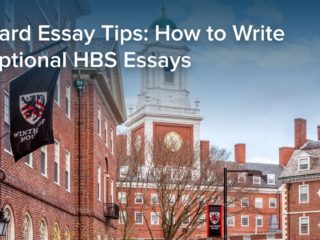| Getting your Trinity Audio player ready... |
If you’re applying for top business schools, you’ll need to write an MBA personal statement. This may also be known as an MBA statement of purpose.
In this article, we’ll discuss the elements of an MBA personal statement. Specifically, we’ll discuss why the personal statement is important. We’ll also review the MBA personal statement format. Finally, we’ll share tips on school-specific prompts and answer frequently asked questions.
Here are the topics we’ll cover:
- What Is an MBA Personal Statement?
- How to Structure Your Personal Statement
- Personal Statement Templates
- Common MBA Essay Prompts
- School-Specific Prompts
- Key Takeaways
- Frequently Asked Questions (FAQ)
- What’s Next?
Let’s begin by discussing exactly what an MBA personal statement is.
What Is an MBA Personal Statement?
An MBA personal statement describes your interest in pursuing an MBA. Specifically, this essay dives into your career and personal story. It also shares your future goals. Finally, this essay discusses why you are pursuing a business degree and where. So, let’s discuss why your personal statement is important.
Why Is the Personal Statement Important?
The statement of purpose communicates your motivations to the MBA admissions committee. After all, the MBA is a professional degree. Therefore, you must state your intentions. You must clearly communicate how an MBA will benefit you.
Additionally, full-time MBA programs want you to land a job. Therefore, the MBA personal statement will build confidence with admissions committees. Your personal statement shares how your past achievements, experiences, and skills will help your career.
TTP PRO TIP:
Treat your personal statement as an opportunity to communicate your motivations to admissions committees.
Next, let’s discuss how to structure your personal statement.
How to Structure Your Personal Statement
The format and structure of your MBA personal statement will vary, depending on the program. However, there are some common steps to approach these essays. Let’s discuss these steps and their importance.
Construct Your Personal Narrative
First, you should aim to create a personal narrative. This is because most engaging personal statements use storytelling. In other words, it’s much more interesting to read a story, rather than a formal essay.
However, we understand that storytelling is not always intuitive. This is especially true if you’ve been out of school for a few years.
To start, consider how you tell stories to your friends. Keep your phrasing conversational. This technique delivers your message clearly and concisely.
Finally, your stories shouldn’t be long-winded. In fact, the word counts for many MBA essays will prevent this.
TTP PRO TIP:
The most engaging personal statements are written as stories. You don’t need a five-paragraph essay format or a thesis statement!
Share Your Relevant Experience
Depending on the prompt, you might need to share details about your experiences. While it may be tempting to tell your life story, you don’t have space. Instead, curate your response.
We recommend that you share details and experiences that are most relevant. Ideally, these details and experiences connect to your goals. After all, your pursuit of an MBA is the next step in your journey.
TTP PRO TIP:
Curate your experiences and share what’s most relevant to pursuing your MBA.
Communicate Your Goals
It’s essential to communicate your goals in your personal statement. MBA admissions officers want to know what you’re pursuing next. Therefore, an MBA should help you achieve your goal.
We recommend including a clear description of your goals. Include your desired industry (such as banking, consulting, consumer goods, etc). Additionally, share your desired function (such as marketing, finance, etc). Finally, provide target companies.
Let’s put this all together. Here’s an example: “I want to become a product manager at a large tech company, like Amazon, Meta, or Google.” This statement communicates exactly what you want to do —and where.
TTP PRO TIP:
Develop an elevator pitch describing your future goals. Share your desired post-MBA industry, function, and target companies.
Position the MBA Experience
Finally, your MBA personal statement should discuss why you’re pursuing an MBA. Admissions committees at top MBA programs want to know why you want to attend their school.
Therefore, you must understand how the degree will help. To start, do some research. For example, attend virtual info sessions to learn about specific MBA programs. Then, talk with students and alums. These conversations will be critical to improve your knowledge.
TTP PRO TIP:
Research your target MBA programs to understand how the degree will help you.
Now that we know how to structure a personal statement, let’s examine some tips for putting together a great personal statement.
Personal Statement Templates
There is no standard template for an MBA personal statement. Unfortunately, there are many essay prompts across MBA applications. As a result, a single template would not work.
That said, let’s discuss a few things you might include.
MBA Personal Statement Header
What is an MBA personal statement header? Some think it’s the text at the top of a document. If you’re wondering what to write, follow the application instructions. Some applications ask candidates to include the essay question. As a result, the admissions committee will know which question you are answering.
Others think the word “header” references an introduction. We do not recommend writing a formal introduction. Instead, you should tell a story.
The introduction is an opportunity to pull your reader into a story. For example, it could set the stage for a memorable scene: What is happening? Who is talking? What happens next? Just make sure that the anecdote is relevant to your essay.
Another way to start is by sharing a quote. However, don’t share a quote just because. Ensure that the quote is relevant to your essay.
MBA Personal Statement Examples
The best business school personal statements use first-person narratives. They also include the components we’ve discussed in this article. However, top MBA applications each have different essay prompts. Therefore, there isn’t a single best example.
Keep reading to learn more about school-specific prompts. Our analyses will help you write engaging essays.
An experienced MBA admissions consultant can also help. Consultants help you write and iterate on your essays. This collaboration can transform good essays into great ones.
TTP PRO TIP:
TTP’s experienced admissions consultants will help you create powerful MBA personal statements.
Let’s now discuss some common MBA essay prompts that you can expect to see on your applications.
Common MBA Essay Prompts
Many of the common essay prompts ask about similar things. They ask about your past experiences, future goals, and motivations for getting an MBA. Additionally, these prompts might ask for specifics about your leadership, management, internship experience, and more.
However, there are some key differences across the prompts for top MBA applications.
School-Specific Prompts
Let’s look at some of the essay prompts for Harvard Business School, Stanford Graduate School of Business, and the Wharton School. We’ll analyze the prompts that resemble a personal statement. Then, we’ll provide an analysis on how to respond.
However, these aren’t in-depth analyses. For personalized guidance, connect one-on-one with one of TTP’s experienced admissions consultants.
Harvard MBA Personal Statement
Harvard’s closest question to a personal statement is its first essay. Essay 1 reads as follows:
Please reflect on how your experiences have influenced your career choices and aspirations and the impact you will have on the businesses, organizations, and communities you plan to serve. (up to 300 words)
This prompt asks you to share how your experiences influenced your professional career, goals, and your future impact. Notice that the prompt does not specifically mention professional experiences — it simply says “experiences.” For example, you might consider sharing personal or volunteer experiences, too.
Your future vision can go beyond your professional aspirations. This question is open-ended about your future impact on businesses, organizations, and communities. As a result, you can take a holistic approach.
TTP PRO TIP:
We’ve guided numerous candidates to HBS. For expert help on your HBS essays, reach out to TTP’s experienced MBA admissions consultants.
Stanford MBA Personal Statement
Stanford’s personal statement prompt reads as follows:
Why Stanford? Describe your aspirations and how your Stanford GSB experience will help you realize them. (Recommended: Up to 350 words)
Stanford’s MBA admissions committee wants to learn about your future goals. While you can discuss short- and long-term goals, consider the word “aspirations.” Think holistically about what this means to you.
Additionally, when you discuss your interest in Stanford, be specific. Discuss the curriculum, programming, environment, culture, extracurricular activities, location, and more. Talk about how these opportunities will help you reach your goals. You must research Stanford’s GSB beyond the website. For example, talk to students and alums.
TTP PRO TIP:
Stuck on your Stanford essays? We can help! Reach out to TTP’s experienced MBA admissions consultants to get personalized guidance on your Stanford application.
Wharton MBA Personal Statement
Wharton’s personal statement prompt reads as follows:
How do you plan to use the Wharton MBA program to help you achieve your future professional goals? You might consider your past experiences, short and long-term goals, and resources available at Wharton. (500 words)
Wharton’s admissions committee wants to know your career goals. Additionally, the committee wants to know how your past experiences and career goals drive your interest in Wharton. Therefore, you should share your professional goals and how Wharton’s program will help you achieve them.
To tackle this essay, you must discuss what you’d like to do immediately following the MBA program and in the longer term. Share the target industries, functions, and companies for the short- and long-term. Additionally, discuss your holistic development goals (as a manager, mentor, leader, and more).
Additionally, it’s important to share how Wharton will help you. You must research Wharton’s offerings in advance. These include courses, programs and initiatives, experiential learning opportunities, and more. This essay must be written for Wharton — and only Wharton.
TTP PRO TIP:
If you need guidance from a Wharton expert, we’re ready to help! TTP’s experienced MBA admissions consultants can help you create a Wharton essay and application that you’re proud of.
Key Takeaways
There are numerous aspects to consider for your MBA personal statement. Hopefully, our guide and essay analyses help. Start early and plan to write several drafts. Additionally, get feedback from an experienced admissions consultant or someone who knows you well.
Frequently Asked Questions (FAQ)
Does a personal statement need a title?
Generally, no. However, read the application instructions carefully. You might need to include a specific header in your document.
How long should an MBA personal statement be?
MBA applications each have different requirements. Therefore, the length will vary. For example, the first essay for Harvard Business School is no more than 300 words. Other programs have an open-ended word count. For example, Chicago Booth’s essay prompts do not have a limit.
Read each program’s application instructions when writing your essays.
How do I start an MBA personal statement?
Read the best practices in this article carefully. Unfortunately, there is no single best essay format.
However, there are many ways to write an effective MBA essay. Consider your professional and personal experiences, career goals, and why you want an MBA. Then, write an outline. This will save you time.
If you get stuck, Target Test Prep’s experienced MBA admissions consultants will structure your process. We’ll guide you through the outline and writing stages. We’ll help you work smarter, not harder.
How do I write a personal statement for MBA applications?
Review this article carefully to understand the requirements. Additionally, follow the application instructions for your target MBA programs.
Create your personal statement in phases. Reflect, research, and brainstorm why you’re motivated to pursue an MBA.
What’s Next?
Writing an MBA personal statement and application essays might seem daunting. However, we can help! If you need support, Target Test Prep’s experienced MBA admissions consultants will create a personalized plan.



